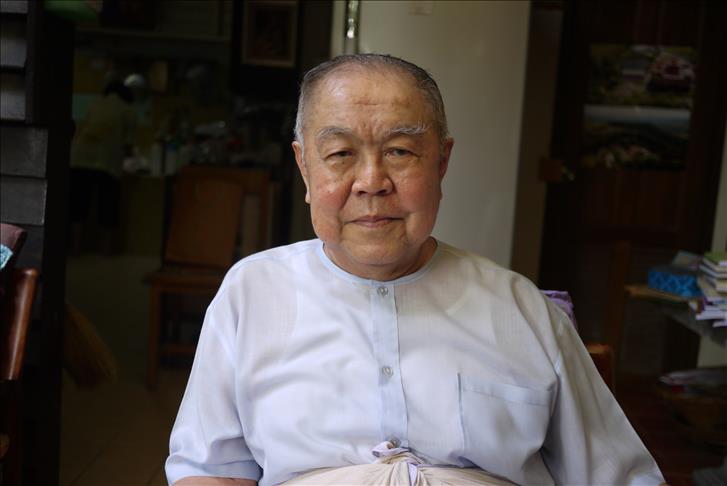
By Max Constant
BANGKOK
An investigation is ongoing into an outspoken Thai intellectual facing fresh accusations of insulting the monarchy over his reported remarks on the behavior of two past kings.
Sulak Sivaraksa, an 83-year-old prominent intellectual and Buddhist scholar, has defended himself against the lese-majeste accusations, telling Anadolu Agency that “the judges are extending the scope of the lese-majeste law in order to prevent all kinds of freedom.”
Although Sivaraksa’s exact remarks cannot be reproduced – as that itself could be considered lese-majeste - the writer and social commentator had spoken about the reign of King Chulalongkorn, who ruled between 1868 and 1910, and King Prajadhipok who reigned between 1925 and 1935.
Sivaraksa, known for fighting against military dictatorships and corrupt civilian governments, had also spoken about the attitude of Prince Rangsit -- the current king’s uncle -- at the time of the mysterious death in June 1946 of King Ananda, the current king’s brother.
Under Article 112, anyone who “threatens, defames or insults the King, the Queen, the Heir apparent or the regent” can face a jail term of 3 to 15 years.
Strictly speaking, past kings are not covered by the lese-majeste law.
But when a Thai journalist who moderated the seminar in June where Sivaraksa made the comments pointed to this fact when interrogated by police last month, a police officer told him that a person had already been sentenced for a similar offense.
The convicted was handed a jail term of two years in a 2013 ruling for allegedly criticizing the reign of King Mongkut, who ruled Siam between 1851 and 1868.
The judges considered that “if there are insults or defamation of a deceased king, they may still have repercussions on the feelings of the people and that may lead to dissatisfaction and may have repercussions on the national security of the kingdom.”
Judges have been implementing the lese-majeste law more and more widely amid increased political tensions in Thailand. Many critics consider the law to be anachronistic and mostly used by authorities to stifle political enemies.
“I am known to be a royalist,” Sivaraksa, who is regularly invited by international organizations to speak at events overseas, told Anadolu Agency Sunday.
“I am now 83. If they want to charge me 15 years, I would pass the end of my life in jail happily,” he added.
Sivaraksa, who has been charged with lese-majeste several times in the past, expressed hope that the newly reshuffled government, headed by junta leader-cum-Prime Minister General Prayuth Chan-ocha, will adopt an understanding attitude on the case.
“Now that there is a civilian foreign minister, maybe authorities will want to show that they want to improve the rule of law,” sad the scholar, who is among 50 members of the World Future Council, a group of “alternative Nobel peace prizes” composed of civil society and academic personalities who are working for a healthier and more sustainable planet.
Lese-majeste cases have surged since the May coup last year when the military overthrew the elected government of Yingluck Shinawatra and seized power.
According to the United Nations Office for Human Rights, at least 40 people have either been convicted or are in pre-trial detention for lese-majeste offenses since then.
Among the latest cases are the sentencing earlier this month of two accused to record terms under article 112.
On Aug. 7, a suspect identified as Pongsak S. was sentenced to 30 years in prison for several Facebook posts deemed insulting to the royal family while a certain Sasiwimol, an hotel employee and mother-of-two, was also handed a 28-year term for six comments on the platform.
The United Nations Human Office had responded by saying it was “appalled by the shockingly disproportionate prison terms,” and calling for the “immediate release of all those jailed or held in prolonged pre-trial detention for the exercise of their rights to freedom of expression.”
Release on bail is systemically denied for those charged and all lese-majeste trials since the coup have been held on camera in front of military courts, where there is no right to appeal.
Anadolu Agency website contains only a portion of the news stories offered to subscribers in the AA News Broadcasting System (HAS), and in summarized form. Please contact us for subscription options.

